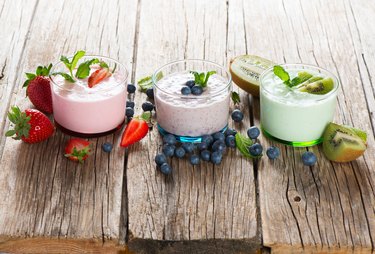
Diet and fitness products are a multibillion-dollar industry and, while much of the focus is on weight loss, there are hundreds of products designed to help you gain weight. Putting on a few pounds can benefit your health if you're underweight, or it can help fill out your frame if you feel you're too skinny. Some weight gain pills or drinks can help you add pounds, but you don't necessarily need to shell out money for supplements to see results. Check with your doctor before changing your diet or supplement regimen to avoid side effects, and for help in setting realistic weight-gain goals.
Weight Gain 101
Video of the Day
No matter what approach you'd like to take -- whether you include supplements or not -- weight gain requires eating more calories than you burn. This creates a positive energy balance, which allows your body to store the extra energy as fat, or use it to create muscle. In general, you'll need between 250 and 500 more calories than you burn per day. Over the course of a week, this allows you to gain between 0.5 and 1 pound. If you have trouble putting on weight, an extra 1,000 calories daily might allow for weight gain.
Video of the Day
How many calories that works out to depends on a few factors; consult a professional, or use an online energy needs calculator to figure out what you'd need to maintain your weight. Then add the extra calories for weight gain.
Certain weight gain supplements provide calories that can help you create a positive energy balance, but you could also get those extra calories from food.
The Skinny on Weight Gain Pills
Weight gain pills don't typically serve as concentrated sources of calories, so they don't cause weight gain by boosting your calorie intake. Instead, certain pills claim to increase your appetite -- therefore making it easier for you to eat more -- or they complement your diet and exercise routine to make it easier to gain muscle.
One weight gain pill that might help is creatine. Taking creatine pills might boost your athletic performance and help you metabolize fuel more easily, which can help you power through tough workouts, including weightlifting. It might also promote muscle growth and increase your lean muscle mass, notes the University of Maryland Medical Center, though more research is needed to know for sure.
Watch out for weight gain supplements made from herbal blends. One leading weight gain supplement, for example, boasts an "appetite-boosting" herbal blend containing ginseng. However, there's no compelling evidence to link ginseng to weight gain, notes Columbia University. Herbal supplements can also have side effects, even if the bottle doesn't include health warnings or claims there are no side effects. Ginseng, for instance, can cause headaches, difficulty sleeping and even high blood pressure in some people.
Always talk to your doctor before you start taking any weight gain pill or herbal supplement to avoid harmful side effects.
Using Drinks to Gain Weight
You may see better results from including weight gain drinks in your daily routine. Even a simple protein shake offers a significant amount of calories. For example, a shake made from one commercially available protein shake offers 150 calories per 2-scoop serving, while a 3-scoop serving of a different protein powder contains 300 calories. Other weight gainer drinks can be even higher in calories; one commercially available vanilla-flavored weight gain powder boasts 750 calories per serving. A single serving of this weight gainer, added to your regular meal plan, would allow you to gain 1.5 pounds weekly -- more than is recommended for the average person, but a potentially helpful option for those that have trouble gaining weight.
While many weight gain drinks don't contain the herbal blends found in some pills, high-protein drinks can cause serious health problems if you have certain health conditions, including kidney disease. Talk to your doctor before you take protein or weight gain drinks to make sure they're safe for you.
Regular Drinks and Foods Help You Gain, Too
If you can't take weight gain pills or drinks due to a health issue, or you simply don't want to spend the money on supplements, don't worry -- you don't need weight gainers to put on pounds.
Try making your own weight gain drink by blending a cup of whole milk with a cup of your favorite frozen fruit -- use frozen pineapple, and you'll get an icy tropical beverage that has 232 calories. Or blend a cup of vanilla soy milk with a half-cup of pumpkin puree, a 6-ounce container of nonfat Greek yogurt, a dash of pumpkin pie spice and a few handfuls of ice cubes for a drink that has 229 calories. Simply drinking one of these simple smoothies in addition to your regular diet will be enough to gain almost half a pound a week.
Alternatively, foods can provide extra calories for weight gain. Serve 2 slices of whole-grain toast with 2 tablespoons of almond butter for a meal that contains 350 calories, snack on an ounce of pecans to take in 190 calories, or pair your favorite veggies with a half-cup of hummus, which contains 218 calories.
- North Carolina State University: How to Gain Weight Healthfully
- McKinley Health Center: Gaining Weight the Healthy Way
- Amazon: Weight Gain Pills
- Go Ask Alice: Ginseng -- Does It Work? How?
- University of Maryland Medical Center: Creatine
- HealthAliciousNess: Nutrient Facts Comparison Tool (Whey Protein)
- GNC: GNC Pro Performance AMP Amplified Mass XXX -- Vanilla
- Gatorade Sports Science Institute: Muscle Builder Supplements
- HealthAliciousNess: Nutrient Facts Comparison Tool (Milk, Pineapple, Bread)
- HealthAliciousNess: Nutrient Facts Comparison Tool (Almond Butter, Pecans, Hummus)
- HealthAliciousNess: Nutrient Facts Comparison Tool (Soy Milk, Pumpkin, Greek Yogurt)